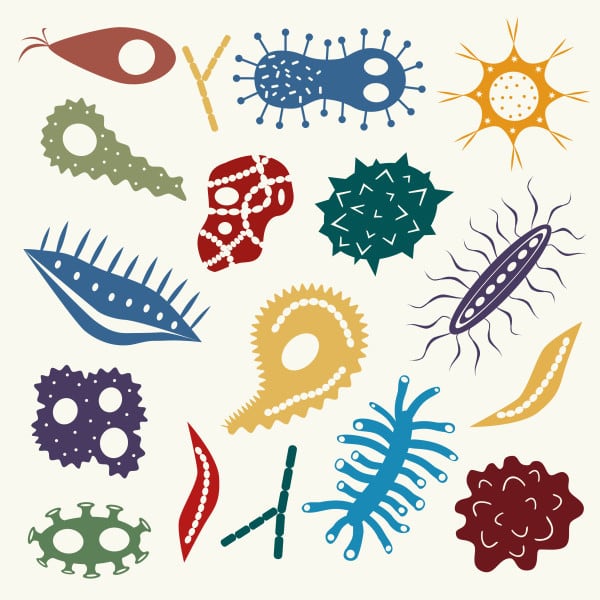Diet-Induced Dysbiosis of the Intestinal Microbiota and the Effects on Immunity and Disease
Read full article HERE
Abstract
Diet-induced Changes in our Gut Microbes. The gastrointestinal (GI) microbiota is the collection of microbes which reside in the GI tract and represents the largest source of non-self antigens in the human body. The GI tract functions as a major immunological organ as it must maintain tolerance to commensal and dietary antigens while remaining responsive to pathogenic stimuli. If this balance is disrupted, inappropriate inflammatory processes can result, leading to host cell damage and/or autoimmunity. Evidence suggests that the composition of the intestinal microbiota can influence susceptibility to chronic disease of the intestinal tract including ulcerative colitis, Crohn’s disease, celiac disease and irritable bowel syndrome, as well as more systemic diseases such as obesity, type 1 diabetes and type 2 diabetes. Interestingly, a considerable shift in diet has coincided with increased incidence of many of these inflammatory diseases. It was originally believed that the composition of the intestinal microbiota was relatively stable from early childhood; however, recent evidence suggests that diet can cause dysbiosis, an alteration in the composition of the microbiota, which could lead to aberrant immune responses. The role of the microbiota and the potential for diet-induced dysbiosis in inflammatory conditions of the GI tract and systemic diseases will be discussed.
Microbial changes in the GI tract have profound effects on host inflammatory and metabolic responses. For example, protein-rich diets increase the activity of bacterial enzymes such as β-glucuronidase, azoreductase and nitroreductase, which produce toxic metabolites that trigger inflammatory responses. Because of the intricate balance that exists within the microbiota, alterations in one group or species may not only affect the host directly, but can also disrupt the entire microbial community. For example, members from the phyla Firmicutes, Actinobacteria, Verrucomicrobium and Bacteroidetes can degrade complex carbohydrates not absorbed by the host and can also inhibit the growth of opportunistic pathogens such as Clostridium spp. and members of Enterobacteriaceae like E. coli . Dysbiosis can also alter the metabolic activity of other members of the microbiota in the gut. Thus, it is conceivable that some diets promote the growth of microbes that could have detrimental effects on their host while other dietary factors could promote beneficial microbes. It is unknown whether diet-induced dysbiosis is a transient or long-term event. If dysbiosis is a long-term event, then postnatal nutrition could be used to promote changes in the microbiota early in life during the development of a more stable microbiota. In support of this, consumption of formula supplemented with fish oil has the capacity to alter the microbial composition in the infant; however, it is unknown if these microbial changes would be long lasting or transient. Although this study did not identify the specific microbes that changed, nor did it examine the effect on intestinal immunity, it does suggest that the microbiota could be modified through dietary factors to enrich beneficial microbes and prevent diseases associated with dysbiosis.
If you liked this post subscribe to my free newsletter today and get a free Paleolicious Snack Guide!
* These statements have not been evaluated by the Food and Drug Administration. The product mentioned in this article are not intended to diagnose, treat, cure, or prevent any disease. The information in this article is not intended to replace any recommendations or relationship with your physician. Please review references sited at end of article for scientific support of any claims made.




















10 Comments
this blog is just what I needed, you read all the research papers and put it into a concise, easy to read chart. Thank you so much.
Sure, Linda! Hope you will sign up for my free newsletter for professionals, too
blessings,
Dr Jill
Great article. I have been having problems with my GI for the past two years and when I asked about whether my flora being unbalanced could be causing these problems my GI Dr had nothing to say. So I have been working on improving my gut microbes myself and I think it may be working. Anything you would recommend for improving the good microbes and killing off the bad ones?
Hi Patricia,
Test don’t guess. See if you can get a comprehensive stool analysis through Genova Diagnostics or Doctor’s Data and possibly a SIBO lactulose breath test. Then treat accordingly with your physician. In the meantime, I recommend probiotic Klaire labs Detox Support, which you can order from manufacturer using code 618 to set up free account.
warmly
Dr Jill
I think just as beneficial if not moreso would be a graph showing which good foods cause an increase in which good bugs/bacteria.
True, but I am just sharing the research that was done. That was not included in this particular article.
Dr Carnahan, very interesting and helpful blog. Thank you. I find also the gut flora an important part of the heeling of any gut inflammation. As well as of the healthy style of living. Somehow the references in the Summary of the dysbiosis are not working, Is it at my end only?. May I ask for them? Thank you again.
Hi Stan,
Here is a link to article – http://www.ncbi.nlm.nih.gov/pmc/articles/PMC3448089/
warmly
Dr Jill
Dr. Jill,
I think I corresponded with you about probiotics on your FB page regarding this blog but I can’t seem to find it now. I believe you mentioned a good probiotic that could be purchased from a company in NV. If this rings a bell, could you send me the name of the probiotic and the company again? I also believe there was a code I needed to purchase.
Thanks so much!
Dawn
Hi Dawn
Yes, I recommend Klaire Labs Detox Support, which you can order direct from manufacturer using code: 618.
best
Dr Jill
Share: